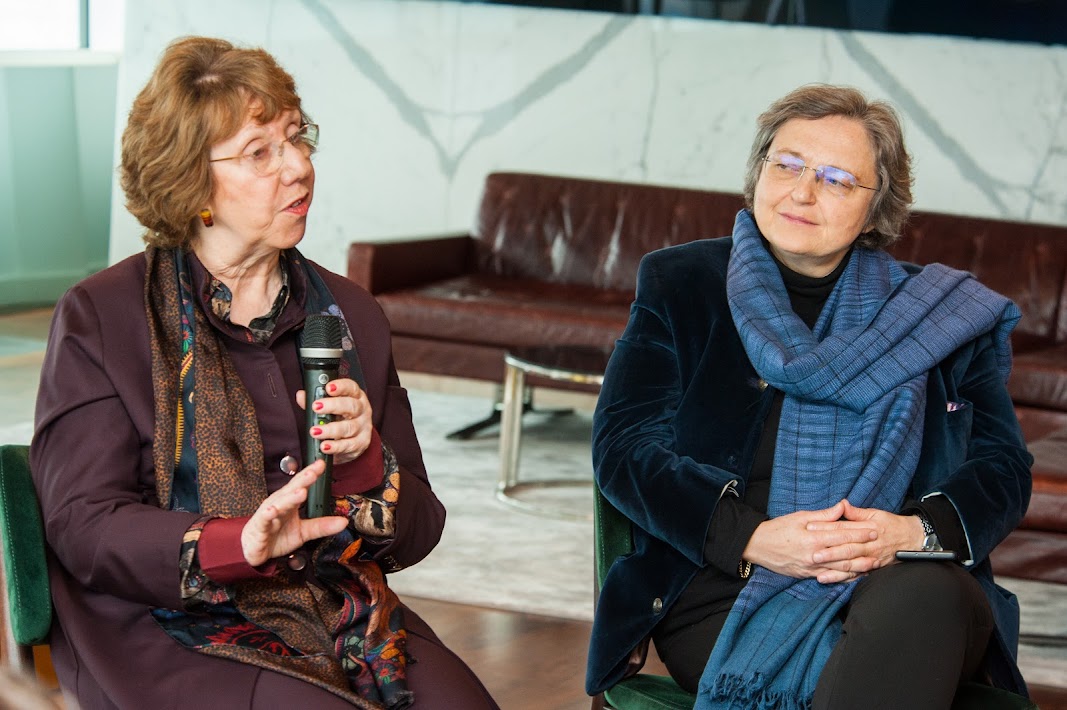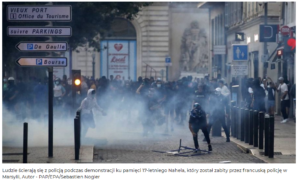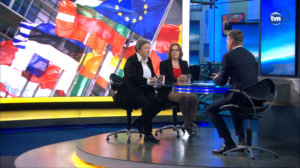Interview with Lady Catherine Ashton „Dialogue

Poniżej prezentujemy wywiad z Lady Catherine Ashton, przeprowadzony podczas jej pobytu w Polsce w marcu 2023.
Lady Catherine Ashton – członkini brytyjskiej Izby Lordów. W latach 2009-2014 była Wysokim Przedstawicielem Unii Europejskiej do spraw zagranicznych i polityki bezpieczeństwa. Powierzono jej zadanie stworzenie europejskiej dyplomacji.

The invasion of Ukraine by Russia has shaken the European security architecture. The member countries of the European Union, along with other members of the Western coalition led by the United States, have taken coordinated actions to support the government in Kiev in its fight against the Russian military. Brussels has also imposed sanctions on Moscow. The European Union has the potential to become one of the key global players in foreign policy and security. However, a challenge it constantly faces is reaching a consensus on a unified policy regarding the diverse interests and priorities of individual states.
So, how does European diplomacy work? What role does it play in other parts of the world? How do EU negotiators and mediators attempt to resolve international disputes? How do women work in this environment? Dr Małgorzata Bonikowska, President of the THINKTANK Centre and the Centre for International Relations, discusses these topics with Lady Catherine Ashton, who has come to Poland at our invitation.
From 2009 to 2014, Catherine Ashton held the position of High Representative of the European Union for Foreign Affairs and Security Policy. During her tenure, she coordinated actions aimed at resolving conflicts and promoting political stability in the EU’s neighboring regions, specifically in the Western Balkans, the Middle East, and North Africa. She played a crucial role in the extensive negotiations for the Iran nuclear agreement, which were concluded in 2015 with the signing of the deal.
Dr. Małgorzata Bonikowska: The war is ongoing in Ukraine. Can the West still negotiate with Putin?
Lady Ashton: It’s difficult to negotiate with authoritarian leaders like Putin because they are not interested in negotiations; they only seek recognition of their own position. Furthermore, both the Russian president and his foreign minister, Sergei Lavrov, deeply believe in the righteousness of their actions. Therefore, there is currently no room for dialogue. The most important thing now is to support Ukraine, which has been attacked by Russia, and ensure the security of the Baltic countries, Poland, as well as Moldova and Georgia.
Dr. Małgorzata Bonikowska: Could this war have been avoided? What did EU diplomacy do to prevent it?
Lady Ashton: It is almost a decade since the aggression from Russia began – and we must not forget that Georgia was already suffering from the taking of its territory in 2008. That issue lies unresolved. The European Union, faced with the annexation of Crimea and the start of the conflict in eastern Ukraine, tried to both impose sanctions and keep the door open for dialogue. In hindsight we should have looked at stronger sanctions but the concerns then that this would harden positions rather than find solutions were strongly held, leading to the approach the EU took. Whether more forceful action at the time could have prevented what happened ten years later is hard to assess but I certainly felt then, and now, that we should have reacted in a stronger way.
Dr. Małgorzata Bonikowska: What can Europe do about Russia? Do you see any chances for peace in the long term?
Lady Ashton: In the long term we need to find ways to ensure that Ukraine is a strong independent nation, making its own choices and determining its own future. To achieve that, Russia must no longer be a threat, militarily or economically. That means we have to continue to support Ukraine and find solutions for the region that bring peace and security for the people who live there – the so-called European Security Architecture. Ultimately, I would hope a time will come when Russia can coexist peacefully with Europe – not everyone in Russia supports what is being done in their name. We want to see Russia transformed into a country that does not pose a threat to others and we need to find ways in the future to engage to that end. However difficult this may be to imagine now, we need to keep this in mind. Sadly with the current leadership the chances of achieving this are extremely remote.
Dr. Małgorzata Bonikowska : War in Ukraine has stirred strong emotions worldwide. The West has united against Russia, providing military, financial, humanitarian, and political support to Ukraine. However, many countries in the so-called Global South are reluctant to condemn Russia and distance themselves from the stance taken by Europe and the USA on this issue.
Lady Ashton: The coalition that has come together in defence of Ukraine and our values of democracy and freedom is a strong one. Alongside European nations and our transatlantic allies, countries such as Japan, Australia and South Korea have joined us. But what the conflict has also exposed is the challenge for some countries in standing up to Russia. This can be for fear of their own vulnerabilities to Russian aggression, because of economic dependence, or feeling that this is a european conflict and nothing to do with them. They are therefore reluctant to condemn Russia or support our call for sanctions. This should give us pause for thought. Not only do we need to reflect on our assumptions but we need to step up our diplomatic efforts to explain the importance of what is happening in Ukraine. We also need to make sure that we find answers to their economic problems by finding substitutes for sanctioned products or resources so they can buy elsewhere. And we have to find ways to offer support where countries feel threatened. I hope much greater effort goes into talking to those who feel this is not an issue for them.
Dr. Małgorzata Bonikowska: Democracy and the rule of law seem to be unpopular in many countries, including Europe. We face this problem as well. How can we build a stable democratic system and protect it from autocrats and populists?
Lady Ashton: The road to democracy is not a straight line. It weaves around, sometimes seeming to turn back on itself, but hopefully continuing to move in the right direction. Countries have taken centuries to get to what we understand as democracy. My own country, Britain, took 700 years from Magna Carta, regarded as the beginning of democracy, to the point where people like me – women – could vote. It can be slow, twisting and frustrating. But it is the best form of government we have. After all, it provides the possibility for people to say goodbye to a government they no longer want. That is why those who would become dictators always move to reduce the ability of people to cast their vote.
Democracy is not just about elections – it is the underpinning framework that means elections that are free and fair can take place. That means freedom of the press, a strong civil society, a judicial system that works, police working for the citizens, political parties able to campaign fairly, access to polling stations and so on. “Deep democracy” as I call it.
Dr. Małgorzata Bonikowska: What specific actions do we need to take? How can we achieve that?
Lady Ashton: It is vital to make sure that the framework in which elections take place and democratic decisions are taken is strong and secure. Working together with communities and civil society to ensure people are held to account is really important – and making sure decisions are taken openly allows for greater scrutiny. The principles and values of the European Union are important and should be the guiding ideals for each nation as we all continue the journey towards strong democracies. But we need to be vigilant and to recognise that economic aspiration is an important part of what people seek from their democratically elected leaders. Economics and politics are interwoven. Building capacity in local communities, engaging people in understanding why democracy matters and being determined to create an inclusive and strong society – these are all elements of deep democracy in action.
Dr. Małgorzata Bonikowska: How should Europe proceed when many countries in the Global South show a desire for economic development but reluctance towards democratic reforms?
Lady Ashton: Economic development and democratic reforms are two sides of the same coin. Without strong democratic frameworks, economic development can be undermined by corruption and lack of transparency. At the same time, without economic opportunities, democratic reforms can be challenging to sustain.
One approach is to focus on promoting economic policies that foster social inclusion and promote social justice. This involves investing in education, infrastructure, and job creation. Collaboration with the private sector is also necessary to promote responsible business practices, fair labor standards, and environmental sustainability.
Dr. Małgorzata Bonikowska: In the Council of the European Union, there are 27 ministers. How is unanimity achieved in such a large group when it comes to European foreign policy?
Lady Ashton: Despite the undeniable challenges, it is possible. Brussels is the only place in the world where ambassadors strive to reach an agreement because they know that failure to do so would be detrimental to the governments they represent. In internal EU matters as well, negotiations can be difficult, but decisions are ultimately made, and solutions are found that benefit the entire Union, rather than being based on national positions. It is important for diplomatic culture to serve the purpose of finding solutions.
EU diplomacy is most effective when it is able to show that the collaboration of all can bring about solutions. The pull of the EU and the potential for stronger relations with it is an important factor in solving problems. For example, only the European Union as a whole could help broker the agreement between Serbia and Kosovo, not individual countries, even the powerful ones.
Dr. Małgorzata Bonikowska: Why is the process of integrating the Western Balkans into the EU so slow?
Lady Ashton: Negotiating the entire body of EU law is challenging and time-consuming. I remember what the process of Poland’s accession to the EU looked like because, as the UK’s Minister of Justice, I traveled to Poland with lawyers and judges. In your case, joining the EU took several years. It is not easy, but I hope the Western Balkans countries will continue to see that their future lies in the EU.
Dr. Małgorzata Bonikowska: How should the European External Action Service operate to make European diplomacy effective? We remember that in 2008, during the war between Russia and Georgia, French President Nicolas Sarkozy negotiated with Putin on behalf of France, not the EU.
Lady Ashton: President Sarkozy negotiated with Putin for the EU. At that time France held the rotating Presidency of the EU. Since the Lisbon Treaty was implemented there has been a permanent President of the Council, working closely with the High Representative for Security and Foreign Policy and responsible for international issues. The President of the Commission with the strong remit especially on economic matters adds the power of the Commission in supporting solutions. But it is the power of all the countries and institutions working together that matters. There are no issues that one country can resolve alone.
Dr. Małgorzata Bonikowska: French President Emmanuel Macron, as well as other top European politicians, constantly raise the issue of building „European strategic autonomy.” What should it look like?
Lady Ashton: In my opinion, European strategic autonomy should involve taking on a leadership role in our own neighborhood and being courageous enough to solve complex issues independently. When I started working, there was a lot of skepticism about EU foreign policy, but we have shown that we can mediate effectively, for example, in the Serbia-Kosovo conflict. We must continue to be proactive and assertive in resolving problems that impact our region and the world, and draw upon our experience and economic strength to bring about change.
Dr. Małgorzata Bonikowska: Is diplomacy still a world dominated by men?
Lady Ashton: When I first chaired the Foreign Affairs Council of the EU, all the Ministers were men. I was the only woman at the table. Most diplomats I encountered across the world were men too. I worked to try and encourage more women to become Ambassadors for the EU and warmly welcomed women Ministers. Hillary Clinton taught me a lot – always making time for women during her official trips. She was a great source of encouragement, including to me. It is so important that our diplomatic teams are made up of women and men and that we get the breadth and depth of the experience and expertise of both. It enriches our ability to find solutions. It was terrific to see more women coming forward over the years I was in office and to have had the chance to work closely with so many of them.
Dr. Małgorzata Bonikowska: What is the basis for effective negotiations?
Lady Ashton: First, to know what you want to achieve and sticking to it. Particularly in international issues there are often multiple problems. Working out a process of negotiation and deciding what you are going to tackle in a measured, systematic way is really important. That was certainly true in the Iran negotiations. Our task was to provide confidence in the purely peaceful nature of their nuclear programme. There were many other issues but resolving that one was vital to being able to move on to discuss others. Negotiation can be a long and arduous process, and you have to start somewhere. Second, to listen to what the other side is saying and hear what they mean. Your job is to look for opportunities to solve the problem – negotiation means what it says, being prepared to find an answer through dialogue but with pressure where it is needed. Third, being clear about the outcomes you want and need – the jigsaw puzzle that when put together shows a picture of what has been achieved. The size of the pieces don’t matter, but the picture they create does.
Dr. Małgorzata Bonikowska: There is no negotiating success without a broad understanding of the conditions that cause the disputes. How did you manage that?
Lady Ashton: You have to engage in a lot of conversations with people and, above all, listen. One of the biggest challenges for me was the situation in the Horn of Africa. We were dealing with a plague of piracy that threatened trade, and the UN food program. Pirates were often young men, offered huge amounts of money if they captured a ship. Sadly they had few opportunities on the land due to the chaos of 20 years of civil war in Somalia. If we were to solve the problem, negotiate with countries in the region to help deal with pirates and offer better opportunities we needed to develop a more comprehensive approach covering development, aid, institution building and democracy.
Dr. Małgorzata Bonikowska: You have worked in Brussels, but you have also been a member of the House of Lords for 20 years. How do you view Brexit and the current EU-UK relations?
Lady Ashton: I am saddened that the United Kingdom has left the European Union, and the EU has lost the United Kingdom. We did not work hard enough to explain what Europe means to the United Kingdom, and the British did not appreciate what being part of the EU meant. However, I hope in the future the UK will seek closer ties with the EU in foreign policy, security, and defense. In economic matters, we need to establish agreements on goods and services in both directions. It is uncertain, though, whether the UK will ever return to the EU. So, I am not only the first British person to hold the position of EU High Representative for Foreign Affairs, but possibly, and sadly, the last as well.
Dr. Małgorzata Bonikowska: Thank you for the conversation.
[evc_interactive_banner type=”classic” custom_link=”url:https%3A%2F%2Fmastersandrobots.tech%2F|||”]




